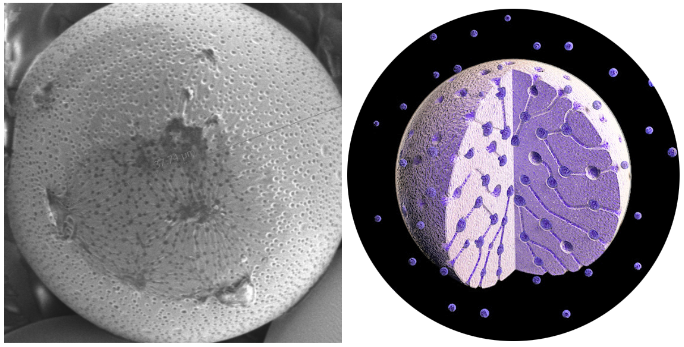Developing long-lasting drug formulations 50% faster
TLDR
Persist helps pharma make drug injections that last up to 1 year.
Using robotics & AI, we reduce a 5-year drug formulation process to ~2 years.
Contact Us (founders@persist-ai.com) for a case-study formulation
To make injections we encapsulate drugs inside injectable microspheres made with FDA-approved materials.
Left: Image of a ~37 um microsphere made by our robotics
Right: A Schematic showing how encapsulated drugs are released over 1 year so patients don’t take as many injections.
🤔THE PROBLEM
For chronic diseases, most patients prefer 1 injection/yr rather than multiple injections per week.
However, making a long-lasting injection takes a lot of trial and error and the time between iterations is long.
Key challenges include:
- Using manual work & intuition is slow: Typical teams manually mix and match chemicals to optimize the amount of drug that’s loaded into the spheres and the rate of release of drug
- Trial and error is cumbersome: Because changing one variable may have multiple effects
- Scale-up is unpredictable: Even if something works at a small scale, batch-to-batch consistency during scale-up is uncertain because production is done in large reactors
💡OUR SOLUTION
We utilize custom robotics and AI to solve the problems with building microspheres.
- We automatically mix & optimize formulations: We use a closed-loop robotics + AI approach so there’s minimal manual work
- We reduce trial & error with AI predictions: We generate 50x more data than most formulation teams and use that data to train AI. This unique data enables us to make better predictions than others.
- We build small batches, faster: So we can QC batches more frequently and scale up predictably
❤️OUR ASKS
Introduce us to friends who work in Pharma. Email founders@persist-ai.com
“Follow” us on LinkedIn
Describe what your company does in 50 characters or less.
Help pharma develop slow release drugs faster
What is your company going to make? Please describe your product and what it does or will do.
For a pharma company to develop a sustained-release (slow release) drug formulation takes about 3-5 years and $10M or more. This is because there are a lot of variables and scientists' intuition (aka guesswork) needed to arrive at the final formulation solution.
We will provide a service to pharma companies to develop their formulations for them 50% faster and cheaper than current methods. To do this we will screen formulations in high throughput using automation and train ML which can make better predictions based on data (rather than guesses).
This will enable pharma companies to get drugs to market faster and earn revenue sooner.


